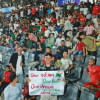Problem No.9: A sobering sign of Bangladesh’s striker shortage

Tapu Barman meant well. But his optimism may be misplaced.
After Bashundhara Kings lifted the Federation Cup, their captain Tapu made an interesting claim to The Daily Star during an interview. He said things were "better than last year" because more local forwards had made their mark on the goal-scoring chart in the recently concluded tournament.
On paper, it seems promising: seven players sharing the top spot. However, the reality isn't as rosy once the surface is scratched.
For starters, when a centre-back like Tapu himself finishes as a joint top scorer, it invites a portal of pessimism. But it's not just about a defender being up there.
The worrying part is that the highest individual tally is just three goals, when all 10 teams played at least four matches, with eventual champions playing a maximum of seven.
Moreover, two are foreign recruits – Samuel Boateng and Mustapha Drammeh – leaving just four local strikers: Arif Hossain of Mohammedan, Nabib Newaz of Rahmatganj, Sazzad Hossen of Brothers Union, and Mohammad Ibrahim of Abahani.
Of those, only Ibrahim has shown any real impact. His goals didn't just pad the stats; they were executed under pressure. He scored the winner against Mohammedan in the group stage, and his equaliser in the final helped send the game into extra time.
The rest? Less convincing. Arif's brace came in a 5-2 win over Fakirerpool, while Nabib's hat-trick came in a 4-0 win – Fakirerpool again on the receiving end – after his team were already 1-0 up. Similarly, Sazzad also bagged a hat-trick in an 8-0 rout of Wanderers.
Great for the headlines, but that won't sway a national coach. Apart from Ibrahim -- typically deployed as a wide forward -- none of these frontmen have done enough to impress Javier Cabrera.
This brings the focus to Bangladesh's fixture against India on 25 March. In Shillong, the visitors had successfully contained the home side's legendary marksman, Sunil Chhetri -- who had come out of retirement prior to the match -- for long periods. However, when opportunities arose for Tapu and his teammates, they were squandered.
Cabrera's starting eleven predictably lacked a proper centre-forward. Shahriar Emon, Sheikh Morsalin, Mujibur Rahman Jonny, and Mohammad Rakib were all wingers or attacking midfielders.
Ibrahim? He was on the bench. When it came to introducing fresh legs, Cabrera opted to shore up the defence instead of taking a gamble on a proper striker. A pragmatic decision in a high-voltage AFC Asian Cup fixture, no doubt.
But let's face it: this No.9 problem is not unique to Bangladesh. It's a global trend. The shift towards possession-heavy systems means fewer spaces for traditional centre-forwards. Harry Kane, Erling Haaland, and Julian Alvarez are exceptions – rare, but invaluable.
No doubt, Bangladesh have made progress in recent years. The team have tightened up defensively and started to develop a clearer identity in how they play in possession, in transitions. But in tight games, where one goal could decide it all, not having a natural striker to bring off the bench is a glaring weakness.
Meanwhile, young and overseas-based talents like Fahamedul Islam, Shamit Shome, and Cuba Mitchell are waiting for their shot at wearing the Bangladesh shirt – following in the footsteps of Jamal Bhuiyan, Tariq Kazi, and, most recently, Hamza Choudhury. While their inclusion would certainly add flair and depth to the squad, the diaspora alone will not solve the striker crisis.
That's the pressing issue: Bangladesh's domestic competitions are not producing forwards who steal the spotlight in big matches. Goals in lopsided fixtures, played in front of empty stands, do little to prepare players for the intensity of international football.
In this case, the solution, as it often does, lies with the Bangladesh Football Federation. It's up to the board to push clubs to develop and scout clinical finishers. The next Sheikh Aslam, Alfaz Ahmed, or Zahid Hasan Emily won't just appear by chance.
Bangladesh need a striker, and fast – if not before their upcoming key encounter against Singapore at home on June 10.

 For all latest news, follow The Daily Star's Google News channel.
For all latest news, follow The Daily Star's Google News channel. 









Comments